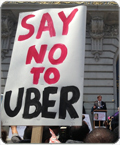
Uber, a 5-year-old company that has raised about $2.7 billion in cash and is valued by investors at over $40 billion, is in the limelight these days. It is expanding at breakneck speed, hiring thousands of drivers in more than 250 cities worldwide, with rumors of an eventual public offering.
Uber champions its “industry-leading standards” for vetting its drivers. On its website, it describes its background checks as “often more rigorous” than those in the traditional taxi industry.
Problems Piling Up for Uber
On Monday, a Dutch court banned UberPop, the company’s low-cost service, from operating in the Netherlands; that same day, the city of Portland, Oregon, sued Uber, saying it was operating an “illegal, unregulated transportation service.” In Spain on Tuesday, a judge issued a temporary ban against Uber’s operations after protests from the country’s taxi associations.
This year, an Uber driver who had been convicted of reckless driving in Florida was arrested in San Francisco in the death of a 6-year-old girl. The child’s family filed a wrongful-death suit. On Monday, the driver was charged with misdemeanor vehicular manslaughter.
Last year, an Uber driver was accused of assaulting a passenger in San Francisco; he had been previously convicted of a felony drug charge, an offense that should have disqualified him from working for Uber under its own procedures.
At the same time, the rigor of Uber’s checks has come into question. On Monday, Uber was banned in New Delhi, India, after a driver was accused of raping a customer; New Delhi authorities said the driver, who was previously accused of raping another female passenger in 2011, was not properly vetted by Uber.
Political Moves
In statehouses across the country, Uber has fought against legislation requiring background checks as strong as those demanded of traditional taxis. Other ride-sharing companies like Lyft and Sidecar, Uber’s chief rivals, have also pushed against the laws, but supporters of stronger background checks say Uber has been by far the most aggressive.
In Colorado, the company helped persuade lawmakers to ease drivers’ background checks in a bill that legalized ride-sharing companies. Uber spent about $60,000 on lobbyists to support legislation that in June made the state one of the first to legalize companies like Uber and Lyft. That law does not require such drivers to undergo the same strict fingerprint checks required of taxi and limousine drivers.
In Illinois, after a lobbying push, Gov. Pat Quinn vetoed a bill that would have forced Uber to strengthen those checks.
And in California, Uber and other companies like it helped kill a law that would have required drivers to undergo a background check by the state’s justice department, as is required of taxi drivers.

